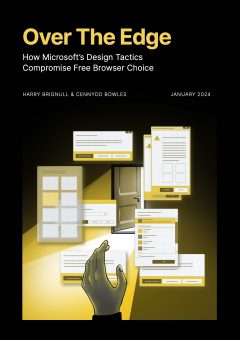The interaction designer and technology ethicist partnered with fellow independent researcher Harry Brignull to explore how Microsoft Windows and Edge are designed to influence users’ web browser choice.
As Cennydd Bowles reflected on the strong media attention his recent research investigating Microsoft’s design practices has received, the Fulbright Visiting Scholar cautioned technology users to be mindful of what companies desire.

“They all want you to use their own browser, their own search engine, etc., and a large part of that is because it means they can get your data,” said Cennydd (pronounced “Kennith”) Bowles, who is teaching in Elon’s Interactive Media graduate program this semester. “As part of our research, we made no evaluation of whether Microsoft Edge is a good browser. That’s not our focus; it may well be the right browser for you. But Microsoft is really keen that you come to that conclusion. So just be critical or skeptical of the choices that technology firms are trying to impose upon you and the directions that they want you to go.”
Bowles offered his warning while discussing his January 2024 report, “Over the Edge: How Microsoft’s Design Tactics Compromise Free Browser Choice.” Published in collaboration with fellow researcher Harry Brignull, the report investigates Microsoft’s design practices across its core operating systems (Windows 10 and 11), web browser (Edge), and search engine (Bing). The findings indicate that Microsoft repeatedly uses harmful design to influence users into using Edge.
The report was commissioned by Mozilla, the maker of free and open-source web browser, Firefox. This fact is widely acknowledged by Bowles and Brignull in an effort to be transparent.
A technology ethicist and interaction designer with 20 years of experience, as well as author of the 2018 book “Future Ethics,” Bowles is uniquely positioned to assess how design influences the choices of consumers. His insights have been quoted by Forbes, WIRED and The Wall Street Journal, and he is a sought-after speaker on the ethics of emerging technology. Additionally, he has spoken about responsible innovation at Facebook, Stanford University and Google, and recently studied practical ethics at the University of Oxford.
Fittingly, Bowles is teaching an Ethics in Interactive Media course this spring, instructing a class of School of Communications graduate students, as well as two communication design majors and an engineering major.
“For me, persuasive design is where a lot of the rubber meets the road,” he said. “When it comes to ethics of technology, technology can persuade, cajole, coerce, manipulate us to do all sorts of things. Sometimes that’s good. Sometimes it’s not, and it’s a bit unexplored and it sits right at the heart of my interests as a designer and as an ethicist.”
According to Bowles, Brignull was originally approached by Mozilla, which was concerned that Microsoft was acting unfairly and sought independent experts to evaluate the multinational technology corporation’s platforms.
Bowles and Brignull had collaborated previously, with Bowles serving as a tech editor for his co-researcher’s most-recent book. By the time Bowles became involved with the Mozilla-supported project, Brignull had conducted the preliminary research, combing through Microsoft’s interfaces and logging details. Bowles supplemented those efforts looking at potential harms and ethical wrongdoings. “I was brought in to explain how what they were doing was deceptive, coercive, manipulative, and recommend change,” he said.

Of all Microsoft’s tactics, the “most objectionable” – according a post on Bowles’ personal blog – is its dissuasive messaging injected directly into the Chrome download page. “For a browser vendor to interfere with the contents of a competitor’s website – or indeed any website – with neither due cause nor user consent is highly irregular and ethically indefensible,” Bowles wrote.
So far, the “Over the Edge” report has generated ample media coverage with pcmag.com, The Register, and techradar.com, among many others, promoting its findings. The most pointed headline was published by windowscentral.com, which wrote: “Hi Microsoft, please stop using ‘harmful designs’ and deceptive tactics to give Edge the competitive advantage over other browsers on Windows, says Mozilla.”
Bowles acknowledged that he expected some level of media interest because the ethics of emerging technology has become a growing topic of interest. “People want to know if our technology is actually good for us,” he said. “Is technology helping us flourish? Or is it trying to drive us to do things that maybe aren’t in our best interests? So there’s some currency to that debate.”
Admittedly, the David vs. Goliath angle of the research doesn’t hurt either.
“This is a story about a very large, powerful company that, historically, has exhibited some questionable behavior,” Bowles said. “And journalists are often sympathetic to criticism of big tech firms.”
Regardless of why a user clicks to read his report, Bowles is hopeful his research is informative and thought-provoking, raising attention to potentially harmful behavior and design.
About the Fulbright Visiting Scholar Program
Each year roughly 900 faculty and professionals from around the world receive Fulbright Scholar grants for advanced research and university lecturing in the United States. Individual grants are available to scholars from more than 100 countries. Individuals who meet the eligibility requirements apply for grants through the Fulbright Commission/Foundation or public affairs section of the U.S. embassy in their home countries. After a thorough selection process in the home country, final approval for awards is issued by the presidentially appointed Fulbright Foreign Scholarship Board in the United States.


